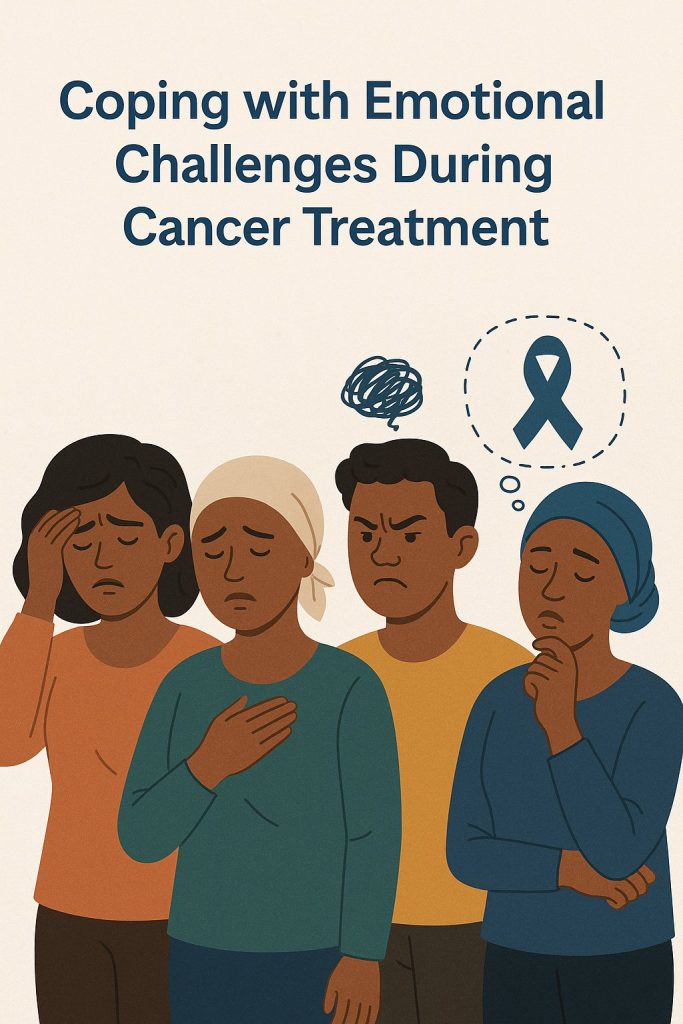It is common for patients living with cancer—and their relatives—to experience emotional challenges while undergoing treatment. And no wonder. Cancer is the second leading cause of death globally. Moreover, it’s a chronic disease. That means it’s long-standing, and you can live with cancer for months or even years. In addition to the constant foreboding of death, the treatment of cancer can be physically, financially, and mentally demanding.
This article aims to guide you through the emotional challenges you might face while treating cancer, and how you can cope.
Examples of Emotional Challenges
Sadness: Sadness is a common and expected reaction in patients diagnosed with cancer. Often coupled with fear, it arises from the looming expectation of death and the disappointment of a life cut short.
Guilt: Some patients feel their lifestyle may have caused the cancer. But the truth is, in the end, no one really knows the exact cause. For instance, though smoking is linked to lung cancer, up to 40% of those diagnosed with lung cancer are non-smokers.
Anger: Patients may feel angry—with themselves, with health workers, even with God. In the face of such a life-altering diagnosis, this emotional reaction is not unusual.
Denial: Denial is the first stage of grief. When you first receive a cancer diagnosis (or any bad news), it’s natural to doubt its reality. But persistent denial may hinder your treatment and recovery.
Pain: Pain is a complex, unpleasant sensation resulting from actual or perceived tissue damage. That means you can feel pain even before real damage begins. Emotional and spiritual pain are real too—and if left unaddressed, they can worsen physical suffering.

Why You Feel This Way
The expectation of death: Yes, cancer is often deadly. But some cancers can be managed for years—or even cured—especially when caught early. Examples include certain blood cancers, placental tumours, prostate cancer, and breast cancer.
Pain and symptoms caused by cancer: Cancer invades the body like an unwanted intruder. It causes pain—often severe—along with symptoms like weight loss that alters body image, festering wounds (e.g., in breast cancer), unsightly swellings, and vomiting blood (e.g., in stomach cancer).
Side effects of treatment: Chemotherapy and radiotherapy involve powerful drugs and radiation. Their side effects—hair loss, vomiting, and skin irritation—can cause additional emotional distress.
Fatigue: Cancer drains your energy. You may struggle to do everyday tasks, and this can be deeply frustrating.
Rigorous treatment routine: The cost of medicines, frequent clinic visits, repeated tests, hospital admissions, and “optimizations” before each cycle can wear you down completely if you’re not prepared.
How to Cope
- Relationships: A problem shared is half-solved. Talk to trusted friends and family. Don’t bottle it up. Share your worries with health workers. Join a support group—many hospitals have them, or you can find one online.
- Stress management: Use helpful techniques like journaling, meditation, and deep breathing. They may sound simple, but they’re powerful tools. Learn how to use them here.
- Stay active: Don’t stay cooped up indoors. Walk in the sunlight and breathe fresh air. Exercise releases feel-good hormones that boost your mood and aid recovery.
- Learn about your condition: Talk to your doctor and read from reliable sources. Ignorance is not bliss—darkness is terror, and knowledge is power.
- Take one day at a time: Cancer brings fatigue, but daily goals can keep you going. Each morning, set one or two achievable tasks. The sense of accomplishment will lift your spirits.
- Engage professionals: If your emotional burden is overwhelming, speak to your doctor. They can connect you with a mental health expert.
A Note to Caregivers
Caregivers often face the same emotional turmoil as patients—sometimes even more intensely. Watching a loved one suffer can be deeply painful. Guilt, helplessness, and burnout are real. So dear caregiver, take care of yourself too. Rest when you can. Talk to someone. Seek help. You cannot pour from an empty cup.
Final Thoughts
Living with cancer is not just a physical battle—it’s an emotional marathon. Whether you’re the patient or the caregiver, remember this: it’s okay to feel sad, angry, or afraid. What matters is how you respond. With the right support, coping strategies, and care, you can endure. You can even thrive.
Let your story be one of courage. Let your journey be filled with grace.









